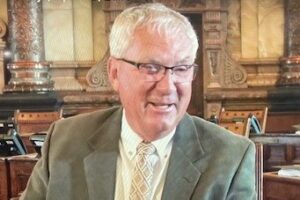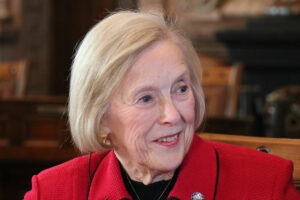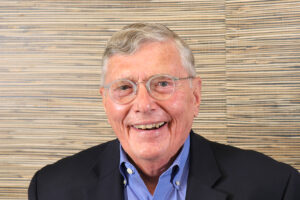Topic: Tax philosophy

Interview of Fred Kerr, April 13, 2018
Interviewed by H. Edward (Ed) Flentje
Fred Kerr reflects on his 15 years in the Kansas Senate representing the 33rd Senate district. He recalls Senate leaders and fellow Senators who helped him as a freshman and whose influence guided him throughout his career. Fred talks about the process involved in securing a leadership position in the Senate and the dynamics of leadership races. He observes how relationships between competitors for leadership offices affected Senators differently and how they worked together in subsequent legislative sessions. He also reflects on how decisions were made regarding tax policy both to fund highways and public schools. Show MoreFred, who ran for Governor in 1994, comments about the increasing influence of money and monied interests in state-wide politics. A previous oral history interview of Fred Kerr is here. Show Less

Interview of Audrey Langworthy, October 18, 2019
Interviewed by Joan Wagnon
This 2019 oral history interview of former Kansas State Senator Audrey Langworthy covers her first race to unseat long-time State Senator Norman Gaar, a race she won in 1984 and her four subsequent terms--a total of 16 years. Some of her new colleagues in the Senate steered her to the Assessment and Taxation Committee which she ultimately chaired and loved. Langworthy's tenacity comes through in the interview as she talks about the steep learning curve when she got to the Senate and to the Tax Committee. She received death threat letters after her vote on capital punishment which she sent Show Moreto the Kansas Bureau of Investigation. This interview includes an interesting discussion of strategy developed to pass the 1999 transportation plan and Langworthy's role in it. Her depiction of her views on leadership, her "personal first bill" on the Oregon Trail, and the Bi-state Cultural District bill are worth reading for insight into how Langworthy operated in the Senate and how the increase in the number of women Senators changed the culture of the Senate. Show Less

Interview of Kent Glasscock, June 11, 2021
Interviewed by Alan Conroy
As Majority Leader, and then as Kansas House Speaker, Kent Glasscock found ways to work productively with the conservative wing of the Republican caucus. The first part of the interview describes how Glasscock decided to run for office and his six campaigns.
As he moved up in leadership, the interview talks about several situations where his views as a moderate Republican clashed with the growing number of conservatives in the Republican caucus. Finally, Speaker Shallenburger called Glasscock to his office and together they made peace and subsequently worked well together. Glasscock cites the school finance bill that Show Moredealt with a capital outlay for school buildings as one of his best, most long-lasting accomplishments as well as the Confined Animal Feeding legislation. Styling himself as a true "policy wonk", Glasscock's descriptions of legislative antics in passing legislation are really interesting. This interview gives a picture of how the legislature transitioned to conservative control during his 12 years in office. Show Less

Interview of Jim Gartner, February 16, 2024
Interviewed by Chris Courtwright
This interview sheds light on several activities related to the Kansas Legislature, particularly the role of lobbyist in decision making and the role of school boards in governance of education. It begins in 1967 with quite a tale of Gartner's service as a young Marine, wounded in VIetnam and how that impacted his career choices. A brief work experience building tires at Goodyear convinced him to get a college degree. Southwestern Bell Telephone hired him as one of the first male telephone operators in Kansas. He ended up as Vice President of External Affairs many years Show Morelater. He began his lobbying career in 1987 partnered with Denny Koch. Together they helped define deregulation and worked with both the legislature and the Kansas Congressional Delegation. In 2009 Gartner was appointed to the USD 437 school board to fill a vacancy. That's where he learned about school finance and governance. In 2016 Rep. Annie Tietze resigned and Gartner won that legislative seat. The House Taxation Committee was a logical appointment, given his lobbying background. The Brownback Tax Experiment was failing, and the legislature was eager to repeal it. Brownback vetoed the bill passed by the legislature; they quickly overrode his veto and restored more conventional tax policy. The interview concludes with a discussion of the food sales tax exemption proposed by Governor Kelly and Gartner's frustration with the legislative process and how it changed over the 30 years of his involvement. Show Less

Interview of Bruce Larkin, April 12, 2024
Interviewed by Chris Courtwright
Larkin's interview focuses extensively on his involvement with tax issues during his 20-year tenure in the legislature, and after, at the Board of Tax Appeals (BOTA). He tells lots of funny stories in the interview, particularly about legislative strategy. Larkin got interested in the legislature because of the American Agriculture movement in the mid-1980's. He joined the Department of Revenue's Use Value Advisory Group at a time when appraising farm ground was difficult. Larkin was a small family farmer who farmed ground that his great grandfather had bought in 1878. Larkin was also interested in education; Show Moreparticularly how small rural communities were faring under the school finance formula. But his consistent interest was in taxation. He was involved in almost every tax issue that surfaced during his 20-year involvement with the legislature, and afterward, as a staff member at the Kansas Department of Revenue or on the Court of Tax Appeal as a judge or as Chief Judge. His discussion of issues surrounding classification and appraisal is very informative. He described changes in the use value appraisal of agricultural land.
Interviews with many of the people mentioned in this interview can be found on this website by using the Search box, or by going to the Statehouse Conversations Collection. Show Less

Interview of Edward Rolfs, September 23, 2024
Interviewed by Chris Courtwright
Rolfs served during a productive period in Kansas politics and he was a key player in tax and fiscal policy, chairing the tax committee through reappraisal and classification. and major income tax reform. Rolfs tells great stories, about his grandfather, Frank Carlson, Governor Bob Bennett and why he wasn't reelected, and leadership races. His interview discusses the rationale for sales tax exemptions, the politics of the severance tax in the 1982 election, the "booster" tax affecting Johnson County, the working relationship on the House Taxation Committee, and the simplification of the Kansas Income tax in 1988. Rolfs Show Moredescribes the conundrum of property tax reappraisal and classification and its resulting impacts on the 1990 governor's race where Joan Finney beat both prior governors, Carlin and Hayden. And Rolfs had several Joan Finney stories and one about Kathleen Sebelius. There is also a great story about how Rolfs, the Young Turk who wanted to cut everything was put on the Ways and Means Subcommittee for SRS and Mental Health/Retardation. Bob Harder, Secretary encouraged Rolf to visit the state institutions and it changed his attitude. The interview closes with his reflections on the state of government 35 years after he served. Show Less

Interview of Ed Berger, May 12, 2025
Interviewed by Mark Tallman
This oral history interview of former Senator Ed Berger and former President of Hutchinson Community College focuses on the role of the community college in the educational system of Kansas. Community colleges were chartered in the 1960's in Kansas and required a local referendum to be approved by the public. Seward, Barton and Johnson counties were the last 3 to charter new colleges in 1969. By 1990 there was a move to changed their governance to the Kansas Board of Regents. Several interviews in this series cover these changes, but Berger's interview really focuses Show Moremore on the community aspect of these institutions and how their educational goals changed as the community needs matured. Distance learning, technical education and linkages with economic activity of the communities were discussed and highlighted. The interview concludes with a discussion of Berger's service in the Kansas Senate as they tried to unwind the "Brownback Tax Experiment" which had led to great fiscal disruption of state finances. Berger's outlook is best described in this quote: "...Kansans are creative and resilient and...will find a way to adjust to it and still serve its public well..." Show Less
